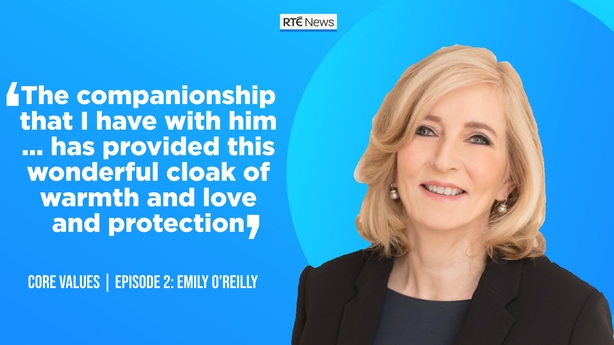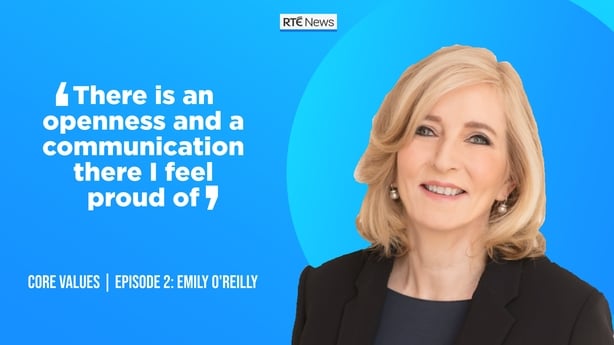After the year that changed our lives, a new podcast from RTÉ, seeks to find out what we really value.
Core Values, presented by RTÉ journalist Carla O'Brien, hears from people in Irish public life and the parts of their lives that are now most important.
Throughout the series, guests will describe the aspects of their lives that have gained, retained or lost value, as well as elaborate on their most valued possessions, and their MVPs – their most valuable players.
Listen to the full episode of Core Values here or wherever you get your podcasts.
"Yes, but how are you?" She knows. Emily O'Reilly knows that after an hour's worth of dealing with technological issues, I have a knot in my stomach that this back and forth might have annoyed my guest.
Her warm and friendly inquiry assures me that it hasn't.
Emily O'Reilly is the European Ombudsman, who is charged with investigating maladministration in the institutions and bodies of the European Union.
The former journalist, author and political editor, was Ireland's first female Ombudsman and Information Commissioner.
Over the past year one of the issues that has been confounding Ms O'Reilly was the guidance on the wearing of face masks, particularly the timing of when they were recommended for use by the World Health Organization (WHO), the European Centre for Disease Control (ECDC) and the Department of Health in Ireland.
"I looked back at my Amazon account and saw that I first ordered face masks on the 26 February 2020. That was probably two months before the WHO, Ireland and the ECDC recommended their wearing. I could not see why we were not wearing face masks. I really couldn't," she said.
She added: "The issue that it was an aerosol borne infection; I'm not a scientist, but it seemed to me obvious that it must be aerosol borne because how else could people get infected so quickly. And yet, why did it take so long for the WHO to officially recognise that it was aerosol borne?"

There are lessons to be learned for "post pandemic land", according to Ms O'Reilly. These include a recalibration of how society values older people.
"We have not been giving value to our older people and our older people in nursing homes. You are aware of the appalling figures in relation to deaths in nursing homes, not just in Ireland. In a way it exposed the deficits in our care.
"This wasn't just a reflection of the pandemic, this is a reflection of how we were as a society, because if we had gotten it right before the pandemic, then possibly we could have gotten it right during the pandemic. Those are lessons for post pandemic land."
She has been angered by the extent to which political and cultural decisions impacted on the trajectory of the virus.
"In Britain you had Boris Johnson, boasting about the fact that he was shaking hands with people who certainly had Covid. I won't describe how angry that made me feel; That a man of his intelligence and his position should do that, was to me, extraordinary. Then you had Trump, and we all know the way he went about it. Then you had Bolsonaro in Brazil, Modi in India, various men who saw it a mark of their manhood that they should deny the epidemic or play it down or keep things open."
The onset of the pandemic coincided, Ms O'Reilly explained, with the "first real empty nest experience" for her and her husband Stephen.
"Our eldest child turned 30 last year and our youngest child turned 21. I have one child in Canada, one in the US and then three in different places in Dublin, so we were experiencing the empty nest for the first time and of course we were geographically away from them as well. For the first time in 30 years, we were on our own.
"After experiencing three decades of the drama and wonderfulness that is child rearing, and adolescent rearing, not quite as wonderful, we thought, 'oh, gosh, here we are, looking at each other'."
"One aspect that has been lovely is finding out that we actually still quite like each other. We really enjoy each other's company, even in the absence of our fabulous children."
She continued: "I do not want to call my husband a possession, but the companionship that I have with him is definitely my most valued possession. It allows everything. It has allowed me and him not to be lonely during this period. It has allowed us to share everything with the children, the ups and the downs. It has allowed me to continue to work, knowing a lot of things have been taken care of. It has provided this wonderful cloak of warmth and love and protection."
"Everybody can point to a particular kind of pandemic issue, whether it is having to care for very elderly parents, whether it's looking after small children, or having a child in the middle of pandemic. But I think the burden of loneliness is particularly acute. I think that has made me value even more the companionship that I share with my husband."
As someone with a highly successful career history, it may come as no surprise to learn that "work-life balance" is a phrase that Ms O'Reilly is not fond of.
But one aspect of her working life has lost value over the past year-and-a-half.
"To be absolutely flippant, wearing high heels. I know this has become a cliché of the pandemic, but I was looking at my high heels the other day and I was saying 'how in God's name, am I going to walk in those again?' But also, you think of the vast amount of time you waste, travelling or just faffing around the place and you think about how all of our work lives could be significantly reduced."

The experience of the pandemic, as well as all of her five children reaching adulthood has afforded Ms O'Reilly time to reflect on her role in their lives.
"I feel ancient now because my daughters come to me after they've found something or heard about something I wrote, maybe, 30 years ago. What to you at the time was just the weekly work or the daily work, and no big deal, over time, morphs into one small piece of the historical Jigsaw.
"When the children grow up and you, to a certain extent, reflect on your parenting and your mothering, and you think, "Did I spend enough time with them, did I collect them often enough from school?"
"When they started noticing some of the things I'd done back in the dark ages, I thought, well, that's something I have given to them through my work; that is something that they can feel good about, because they were proud of me having done that and they found it, to whatever extent, capable of influencing their own lives. So, it basically gets rid of the guilt.
"What I have valued in my children as they have reached adulthood, is that I have a lovely relationship with each of them. There is an openness and a communication there that I feel proud of."
From her love of botanical art and the Weekend FT, to how she cherishes the relationship with each of her five children, Emily O'Reilly shares her Core Values, and gives us an insight into how the pandemic has influenced her perspective on society, community and herself.
To hear Emily’s MVP and the core value, which is central to her life, listen to the full episode of RTÉ's Core Values, hosted by RTÉ journalist Carla O’Brien, wherever you get your podcasts.






